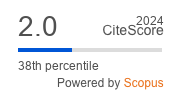RSV Lower Respiratory Tract Illness in Infants of Low- and Middle-income Countries
DOI:
https://doi.org/10.5644/ama2006-124.297Keywords:
RSV, Global Burden, Developed Countries, Risk FactorsAbstract
This review addresses differences in respiratory syncytial virus (RSV) lower respiratory tract illness (LRTI) between industrial- ized and developing countries and provides observations associated with the dissimilar consequences of viral infection in both environments. RSV LRTI is an important cause of morbidity and mortality in infants worldwide. Its burden is highest in de- veloping countries, where most hospitalizations and mortality occur. Palivizumab has been approved for disease prevention in premature infants in numerous countries but its cost and requirement for several doses hampers its routine use. The significant gap between low- and high-income countries in mortality rates stresses the need to identify specific risk factors for RSV LRTI prevention in different populations.
Conclusion. RSV LTRI continues to be a serious problem for industrialised and developing countries, although mortality occurs preferentially in the latter. Several vaccines and monoclonal antibodies to prevent severe disease are advancing steadily in late phase trials. The next decade may witness a change in the landscape of RSV infections in young infants.
Downloads
Published
Issue
Section
License
Copyright (c) 2020 Sofía L. Laudanno, Clara I. Sánchez Yanotti, Fernando P. Polack

This work is licensed under a Creative Commons Attribution-NonCommercial 4.0 International License.





